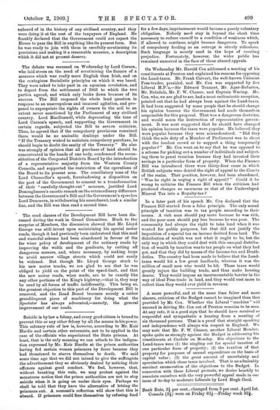On Wednesday Mr. Harold Cox addressed a meeting of his
constituents at Preston and explained his reasons for opposing the Land-taxes. Mr. Frank Calvert, the well-known Unionist Free-trader, presided, and Mr. Cox was supported by five Liberal M.P.'s,—Sir Edward Tennant, Mr. .Agar-Robartes, Mr. Ridsdale, Mr. F. W. Chance, and Captain Waring. Mr. Cox, who, we are glad to see, had a most enthueiastic reception, pointed out that he had always been against the Land-taxes. It had been suggested by some people that he should change his opinion because the Government had made themselves responsible for this proposal. That was a dangerous doctrine, and would mean the destruction of representative govern- ment. It was next suggested that he should have changed his opinion because the taxes were popular. He believed they were popular because they were misunderstood. "Did they think the sole duty of a Member of Parliament was to shout with the loudest crowd or to support a thing temporarily popular ? " Mr. Cox went on to say that he was opposed to a scheme for picking out a number of individuals and subject- ing them to penal taxation because they had invested their savings in a particular form of property. When the Finance Bill was introduced there were thirty-four cases in which British subjects were denied the right of appeal to the Courts of the realm. That position, however, had been abandoned. "Was he right in urging a right of appeal ? " Could it be wrong to criticise the Finance Bill when the criticism had produced changes so enormous as that of the Undeveloped Mineral Tax into a Royalty-tax ?


























































 Previous page
Previous page